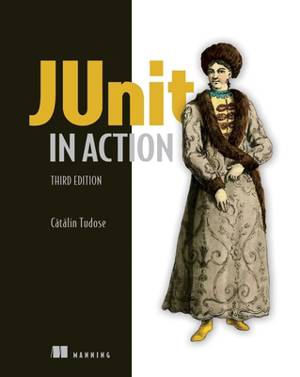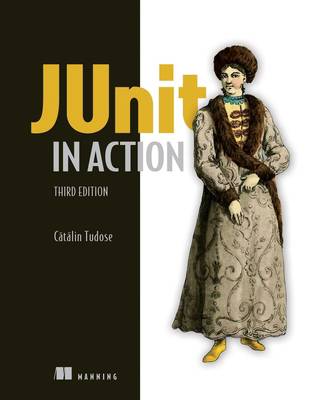
Wil je zeker zijn dat je cadeautjes op tijd onder de kerstboom liggen? Onze winkels ontvangen jou met open armen. Nu met extra openingsuren op zondag!
- Afhalen na 1 uur in een winkel met voorraad
- Gratis thuislevering in België vanaf € 30
- Ruim aanbod met 7 miljoen producten
Wil je zeker zijn dat je cadeautjes op tijd onder de kerstboom liggen? Onze winkels ontvangen jou met open armen. Nu met extra openingsuren op zondag!
- Afhalen na 1 uur in een winkel met voorraad
- Gratis thuislevering in België vanaf € 30
- Ruim aanbod met 7 miljoen producten
Zoeken
Omschrijving
JUnit in Action, Third Edition has been completely rewritten for this release. The book is full of examples that demonstrate JUnit's modern features, including its new architecture; nested, tagged, and dynamic tests; and dependency injection. Summary
JUnit is the gold standard for unit testing Java applications. Filled with powerful new features designed to automate software testing, JUnit 5 boosts your productivity and helps avoid debugging nightmares. Whether you're just starting with JUnit or you want to ramp up on the new features, JUnit in Action, Third Edition has you covered. Extensively revised with new code and new chapters, JUnit in Action, Third Edition is an up-to-date guide to smooth software testing. Dozens of hands-on examples illustrate JUnit 5's innovations for dependency injection, nested testing, parameterized tests, and more. Throughout, you'll learn how to use JUnit 5 to automate your testing, for a process that consumes less resources, and gives you more time for developing. Purchase of the print book includes a free eBook in PDF, Kindle, and ePub formats from Manning Publications. About the technology
The JUnit framework is the gold standard for unit testing Java applications--and knowing it is an essential skill for Java developers. The latest version, JUnit 5, is a total overhaul, now supporting modern Java features like Lambdas and Streams. About the book
JUnit in Action, Third Edition has been completely rewritten for this release. The book is full of examples that demonstrate JUnit's modern features, including its new architecture; nested, tagged, and dynamic tests; and dependency injection. You'll benefit from author Catalin Tudose's unique "pyramid" testing strategy, which breaks the testing process into layers and sets you on the path to bug-free code creation. What's inside Migrating from JUnit 4 to 5
Effective test automation
Test-driven development and behavior-driven development
Using mocks for test isolation
Connecting JUnit 5 with Maven or Gradle About the reader
For intermediate Java developers. About the author
Catalin Tudose has a Ph.D. in Computer Science, and over 15 years of experience as a Senior Java Developer and Technical Team Lead. Previous editions were authored by Petar Tahchiev, Felipe Leme, Gary Gregory, and Vincent Massol. Table of Contents PART 1 - JUNIT 1 JUnit jump-start 2 Exploring core JUnit 3 JUnit architecture 4 Migrating from JUnit 4 to JUnit 5 5 Software testing principles PART 2 - DIFFERENT TESTING STRATEGIES 6 Test quality 7 Coarse-grained testing with stubs 8 Testing with mock objects 9 In-container testing PART 3 - WORKING WITH JUNIT 5 AND OTHER TOOLS 10 Runing JUnit tests from Maven 3 11 Running JUnit tests from Gradle 6 12 JUnit 5 IDE support 13 Coninuous integration with JUnit 5 PART 4 - WORKING WITH MODERN FRAMEWORKS AND JUNIT 5 14 JUnit 5 extension model 15 Presentation-layer testing 16 Testing Spring applications 17 Testing Spring Boot applications 18 Testing a REST API 19 Testing database applications PART 5 - DEVELOPING APPLICATIONS WITH JUNIT 5 20 Test-driven development with JUnit 5 21 Behavior-driven development in JUnit 5 22 Implementing a test pyramid strategy with JUnit 5
JUnit is the gold standard for unit testing Java applications. Filled with powerful new features designed to automate software testing, JUnit 5 boosts your productivity and helps avoid debugging nightmares. Whether you're just starting with JUnit or you want to ramp up on the new features, JUnit in Action, Third Edition has you covered. Extensively revised with new code and new chapters, JUnit in Action, Third Edition is an up-to-date guide to smooth software testing. Dozens of hands-on examples illustrate JUnit 5's innovations for dependency injection, nested testing, parameterized tests, and more. Throughout, you'll learn how to use JUnit 5 to automate your testing, for a process that consumes less resources, and gives you more time for developing. Purchase of the print book includes a free eBook in PDF, Kindle, and ePub formats from Manning Publications. About the technology
The JUnit framework is the gold standard for unit testing Java applications--and knowing it is an essential skill for Java developers. The latest version, JUnit 5, is a total overhaul, now supporting modern Java features like Lambdas and Streams. About the book
JUnit in Action, Third Edition has been completely rewritten for this release. The book is full of examples that demonstrate JUnit's modern features, including its new architecture; nested, tagged, and dynamic tests; and dependency injection. You'll benefit from author Catalin Tudose's unique "pyramid" testing strategy, which breaks the testing process into layers and sets you on the path to bug-free code creation. What's inside Migrating from JUnit 4 to 5
Effective test automation
Test-driven development and behavior-driven development
Using mocks for test isolation
Connecting JUnit 5 with Maven or Gradle About the reader
For intermediate Java developers. About the author
Catalin Tudose has a Ph.D. in Computer Science, and over 15 years of experience as a Senior Java Developer and Technical Team Lead. Previous editions were authored by Petar Tahchiev, Felipe Leme, Gary Gregory, and Vincent Massol. Table of Contents PART 1 - JUNIT 1 JUnit jump-start 2 Exploring core JUnit 3 JUnit architecture 4 Migrating from JUnit 4 to JUnit 5 5 Software testing principles PART 2 - DIFFERENT TESTING STRATEGIES 6 Test quality 7 Coarse-grained testing with stubs 8 Testing with mock objects 9 In-container testing PART 3 - WORKING WITH JUNIT 5 AND OTHER TOOLS 10 Runing JUnit tests from Maven 3 11 Running JUnit tests from Gradle 6 12 JUnit 5 IDE support 13 Coninuous integration with JUnit 5 PART 4 - WORKING WITH MODERN FRAMEWORKS AND JUNIT 5 14 JUnit 5 extension model 15 Presentation-layer testing 16 Testing Spring applications 17 Testing Spring Boot applications 18 Testing a REST API 19 Testing database applications PART 5 - DEVELOPING APPLICATIONS WITH JUNIT 5 20 Test-driven development with JUnit 5 21 Behavior-driven development in JUnit 5 22 Implementing a test pyramid strategy with JUnit 5
Specificaties
Betrokkenen
- Auteur(s):
- Uitgeverij:
Inhoud
- Aantal bladzijden:
- 525
- Taal:
- Engels
Eigenschappen
- Productcode (EAN):
- 9781617297045
- Verschijningsdatum:
- 8/12/2020
- Uitvoering:
- Paperback
- Formaat:
- Trade paperback (VS)
- Afmetingen:
- 185 mm x 231 mm
- Gewicht:
- 884 g

Alleen bij Standaard Boekhandel
+ 165 punten op je klantenkaart van Standaard Boekhandel
Beoordelingen
We publiceren alleen reviews die voldoen aan de voorwaarden voor reviews. Bekijk onze voorwaarden voor reviews.











